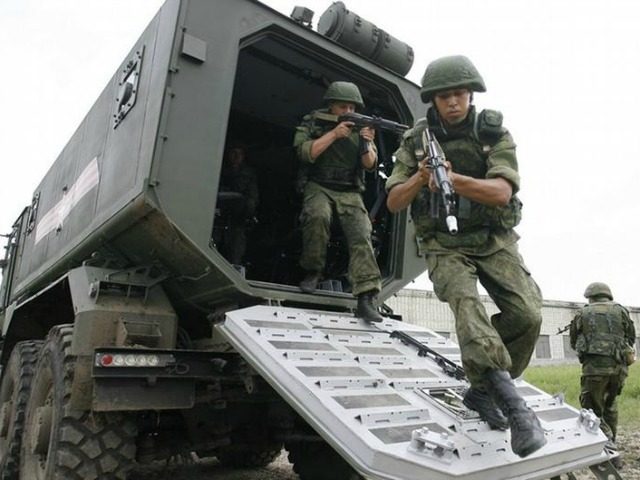In a speech before the Russian Parliament on Wednesday, President Vladimir Putin called for “strengthening the combat readiness of our country” against “aggressive” NATO.
Putin’s address was especially significant because he delivered it on the 75th anniversary of Nazi Germany’s attack on the Soviet Union. (The Russian government does not like to dwell on what the Nazis and Soviets were doing before their relationship turned sour.)
In fact, Reuters reports that Putin explicitly referenced the Nazi invasion while haranguing the West for failing to join Russia in a “modern, non-bloc collective security system” against terrorism.
“The world community did not show enough vigilance, will and consolidation to prevent that war and save millions of lives,” said Putin. “What kind of a lesson is still needed today to discard old and frayed ideological disagreements and geopolitical games and to unite in the fight against international terrorism?”
As for NATO, Putin said the alliance is “strengthening its aggressive rhetoric and its aggressive actions near our borders,” so Russia is “duty-bound to pay special attention to solving the task of strengthening the combat readiness of our country.”
For its part, NATO has expressed fears it cannot act aggressively enough to protect its clients and allies from Russian aggression. In a BBC interview on Monday, Lt. Gen. Ben Hodges warned that the Russians are “able to move huge formations and lots of equipment a long distance very fast,” a capability NATO currently lacks.
As Putin, no doubt, noticed, NATO has been conducting a massive exercise called Anaconda-16, involving more than 31,000 troops from 24 different nations.
Germany’s Foreign Minister, Frank-Walter Steinmeier, seemed sympathetic to Putin’s point about aggression, warning NATO against “saber-rattling and warmongering” after the Anaconda-16 exercise concluded last week.
Russia has also been conducting major exercises near its border with Ukraine, which has good reason to fear the Russians might have a bit of trouble finding their borders on a map.
Lt. Gen. Hodges said the “freedom of movement” demonstrated by Russian forces during these exercises alarmed him: “Their snap exercises that they do, I personally am surprised each time they do it. And so you can see why that scares me.”
He also thought NATO commanded insufficient combat aircraft and anti-air defenses in Eastern Europe, but was hopeful the United States would be “bringing equipment back into Europe,” a development about which the Russians will probably be much less enthusiastic.
NATO Secretary-General Jens Stoltenberg wants to meet with the Russians before NATO’s summit in Warsaw July 8-9, but he told the Associated Press, “I am not certain whether that is possible … but hopefully we will be able to have it shortly after the summit.”
Stoltenberg said NATO was engaged in “dialogue with Russia on the agenda, on the modalities” of a meeting, and the Russians said much the same thing, but neither side clarified why a meeting before the Warsaw summit was off the table.

COMMENTS
Please let us know if you're having issues with commenting.